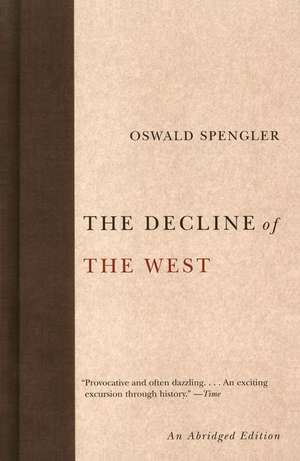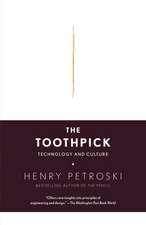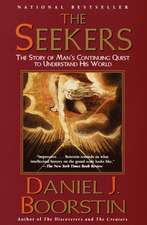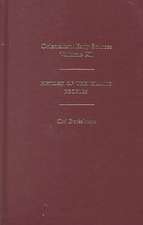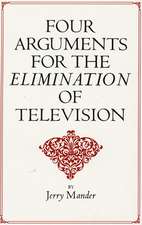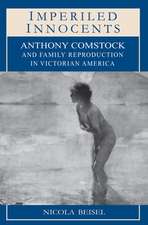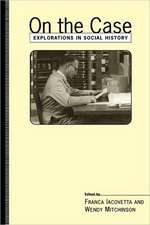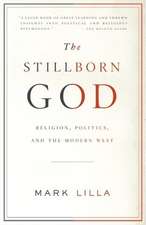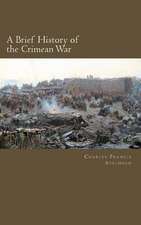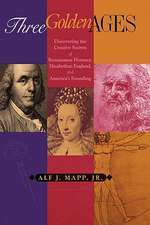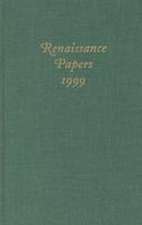The Decline of the West
Autor Oswald Spengler Helmut Werner Traducere de Charles Francis Atkinsonen Limba Engleză Paperback – 31 mar 2006
This abridgment presents the most significant of Oswald Spengler’s arguments, linked by illuminating explanatory passages. It makes available in one volume a masterpiece of grand-scale history and far-reaching prophesy that remains essential reading for anyone interested in the factors that determine the course of civilizations.
Preț: 104.74 lei
Nou
Puncte Express: 157
Preț estimativ în valută:
20.04€ • 21.77$ • 16.84£
20.04€ • 21.77$ • 16.84£
Carte disponibilă
Livrare economică 01-15 aprilie
Preluare comenzi: 021 569.72.76
Specificații
ISBN-13: 9781400097005
ISBN-10: 1400097002
Pagini: 414
Dimensiuni: 134 x 203 x 26 mm
Greutate: 0.43 kg
Ediția:Prescurtată
Editura: Vintage Books USA
ISBN-10: 1400097002
Pagini: 414
Dimensiuni: 134 x 203 x 26 mm
Greutate: 0.43 kg
Ediția:Prescurtată
Editura: Vintage Books USA
Notă biografică
Oswald Spengler, one of the most controversial historians of the twentieth century, was born in Blankenburg, Germany, in 1880. He studied mathematics, philosophy, and history in Munich and Berlin. Except for his doctor’s thesis on Heraclitus, he published nothing before the first volume of The Decline of the West, which appeared when he was thirty-eight. The Agadir crisis of 1911 provided the immediate incentive for his exhaustive investigations of the background and origins of our civilization. Spengler chose his main title in 1912, finished a draft of the first volume two years later, and published it in 1918. The second, concluding volume was published in 1922. The Decline of the West was first published in this country in 1926 (Vol. 1) and 1928 (Vol. 2); this abridged edition was first published here in 1962.
For many years Spengler lived quietly in his home in Munich, thinking, writing, and pursuing his hobbies–collecting pictures and primitive weapons, listening to Beethoven quartets, and reading the comedies of Shakespeare and Molière. He took occasional trips to the Harz Mountains and to Italy. In 1936, three weeks before his fifty-sixth birthday, he died in Munich of a heart attack.
For many years Spengler lived quietly in his home in Munich, thinking, writing, and pursuing his hobbies–collecting pictures and primitive weapons, listening to Beethoven quartets, and reading the comedies of Shakespeare and Molière. He took occasional trips to the Harz Mountains and to Italy. In 1936, three weeks before his fifty-sixth birthday, he died in Munich of a heart attack.
Extras
I
INTRODUCTION
In this book is attempted for the first time the venture of predetermining history, of following the still untravelled stages in the destiny of a Culture, and specifically of the only Culture of our time and on our planet which is actually in the phase of fulfilment--the West European--American.
Is there a logic of history? Is there, beyond all the casual and incalculable elements of the separate events, something that we may call a metaphysical structure of historic humanity, something that is essentially independent of the outward forms--social, spiritual and political--which we see so clearly? Are not these actualities indeed secondary or derived from that something? Does world-history present to the seeing eye certain grand traits, again and again, with sufficient constancy to justify certain conclusions? And if so, what are the limits to which reasoning from such premisses may be pushed?
Is it possible to find in life itself--for human history is the sum of mighty life-courses which already have had to be endowed with ego and personality, in customary thought and expression, by predicating entities of a higher order like "the Classical" or "the Chinese Culture," "Modern Civilization"--a series of stages which must be traversed, and traversed moreover in an ordered and obligatory sequence? For everything organic the notions of birth, death, youth, age, lifetime, are fundamentals--may not these notions, in this sphere also, possess a rigorous meaning which no one has as yet extracted? In short, is all history founded upon general biographic archetypes?
The decline of the West, which at first sight may appear, like the corresponding decline of the Classical Culture, a phenomenon limited in time and space, we now perceive to be a philosophical problem that, when comprehended in all its gravity, includes within itself every great question of Being.
If therefore we are to discover in what form the destiny of the Western Culture will be accomplished, we must first be clear as to what culture is, what its relations are to visible history, to life, to soul, to nature, to intellect, what the forms of its manifestation are and how far these forms--peoples, tongues and epochs, battles and ideas, states and gods, arts and craftworks, sciences, laws, economic types and world-ideas, great men and great events--may be accepted and pointed to as symbols.
The means whereby to identify dead forms is Mathematical Law. The means whereby to understand living forms is Analogy. By these means we are enabled to distinguish polarity and periodicity in the world.
It is, and has always been, a matter of knowledge that the expression-forms of world-history are limited in number, and that eras, epochs, situations, persons, are ever repeating themselves true to type. Napoleon has hardly ever been discussed without a side-glance at Caesar and Alexander--analogies of which, as we shall see, the first is morphologically quite in acceptable and the second is correct. Frederick the Great, in his political writings--such as his Considerations, 1738--moves among analogies with perfect assurance. Thus he compares the French to the Macedonians under Philip and the Germans to the Greeks. "Even now," he says, "the Thermopylae of Germany, Alsace and Lorraine, are in the hands of Philip," therein exactly characterizing the policy of Cardinal Fleury. We find him drawing parallels also between the policies of the Houses of Habsburg and Bourbon and the proscriptions of Antony and of Octavius.
Still, all this was only fragmentary and arbitrary, and usually implied rather a momentary inclination to poetical or ingenious expressions than a really deep sense of historical forms. In this region no one hitherto has set himself to work out a method, nor has had the slightest inkling that there is here a root, in fact the only root, from which can come a broad solution of the problems of History. Analogies, insofar as they laid bare the organic structure of history, might be a blessing to historical thought. Their technique, developing under the influence of a comprehensive idea, would surely eventuate in inevitable conclusions and logical mastery. But as hitherto understood and practised, they have been a curse, for they have enabled the historians to follow their own tastes, instead of soberly realizing that their first and hardest task was concerned with the symbolism of history and its analogies.
Thus our theme, which originally comprised only the limited problem of present-day civilization, broadens itself into a new philosophy--the philosophy of the future, so far as the metaphysically exhausted soil of the West can bear such, and in any case the only philosophy which is within the possibilities of the West European mind in its next stages. It expands into the conception of a morphology of world-history, of the world-as-history in contrast to the morphology of the world-as-nature that hitherto has been almost the only theme of philosophy. And it reviews once again the forms and movements of the world in their depths and final significance, but this time according to an entirely different ordering, which groups them, not in an ensemble picture inclusive of everything known, but in a picture of life, and presents them not as things-become, but as things-becoming.
The world-as-history, conceived, viewed and given form from out of its opposite, the world-as-nature--here is a new aspect of human existence on this earth. As yet, in spite of its immense significance, both practical and theoretica1, this aspect has not been realized, still less presented. Some obscure inkling of it there may have been, a distant momentary glimpse there has often been, but no one has deliberately faced it and taken it in with all its implications. We have before us two possible ways in which man may inwardly possess and experience the world around him. With all rigour I distinguish (as to form, not substance) the organic from the mechanical world-impression, the content of images from that of laws, the picture and symbol from the formula and the system, the instantly actual from the constantly possible, the intents and purposes of imagination ordering according to plan from the intents and purposes of experience dissecting according to scheme; and--to mention even thus early an opposition that has never yet been noted, in spite of its significance--the domain of chronological from that of mathematical number.
Consequently, in a research such as that lying before us, there can be no question of taking spiritual-political events, as they become visible day by day on the surface, at their face value, and arranging them on a scheme of "causes" or "effects" and following them up in the obvious and intellectually easy directions. Such a "pragmatic" handling of history would be nothing but a piece of "natural science" in disguise, and for their part, the supporters of the materialistic idea of history make no secret about it--it is their adversaries who largely fall to see the similarity of the two methods. What concerns us is not what the historical facts which appear at this or that time are, per se, but what they signify, what they point to, by appearing. I have not hitherto found one who has carefully considered the morphological relationship that inwardly binds together the expression-forms of all branches of a Culture. Yet, viewed from this morphological standpoint, even the humdrum facts of politics assume a symbolic and even a metaphysical character, and--what has perhaps been impossible hitherto--things such as the Egyptian administrative system, the Classical coinage, analytical geometry, the cheque, the Suez Canal, the book-printing of the Chinese, the Prussian Army, and the Roman road-engineering can, as symbols, be made uniformly understandable and appreciable.
But at once the fact presents itself that as yet there exists no theory-enlightened art of historical treatment. What passes as such draws its methods almost exclusively from the domain of that science which alone has completely disciplined the methods of cognition, viz., physics, and thus we imagine ourselves to be carrying on historical research when we are really following out objective connexions of cause and effect. Judged by the standards of the physicist and the mathematician, the historian becomes careless as soon as he has assembled and ordered his material and passes on to interpretation. That there is, besides a necessity of cause and effect--which I may call the logic of space--another necessity, an organic necessity in life, that of Destiny--the logic of time--is a fact of the deepest inward certainty, a fact which suffuses the whole of mythological religions and artistic thought and constitutes the essence and kernel of all history (in contradistinction to nature) but is unapproachable through the cognition-forms which the Critique of Pure Reason investigates. This fact still awaits its theoretical formulation.
Mathematics and the principle of Causality lead to a naturalistic, Chronology and the idea of Destiny to a historical ordering of the phenomenal world. Both orderings, each on its own account, cover the whole world. The difference is only in the eyes by which and through which this world is realized.
THE MEANING OF HISTORY FOR THE INDIVIDUAL
Nature is the shape in which the man of higher Cultures synthesizes and interprets the immediate impressions of his senses. History is that from which his imagination seeks comprehension of the living existence of the world in relation to his own life, which he thereby invests with a deeper reality. Whether he is capable of creating these shapes, which of them it is that dominates his waking consciousness, is a primordial problem of all human existence.
Man, thus, has before him two possible ways of regarding the world. But it must be noted, at the very outset, that these possibilities are not necessarily actualities, and if we are to enquire into the sense of all history we must begin by solving a question which has never yet been put, viz., for whom is there History? The question is seemingly paradoxical, for history is obviously for everyone to this extent, that every man, with his whole existence and consciousness, is a part of history. But it makes a great difference whether anyone lives under the constant impression that his life is an element in a far wider life-course that goes on for hundreds and thousands of years, or conceives of himself as something rounded off and self-contained. For the latter type of consciousness there is certainly no world-history, no world-as history. But how if the self-consciousness of a whole nation, how if a whole Culture rests on this ahistoric spirit? How must actuality appear to it? The world? Life?
ANTIQUITY AND INDIA: UNHISTORICAL
What diaries and autobiographies yield in respect of an individual, that historical research in the widest and most inclusive sense--that is, every kind of psychological comparison and analysis of alien peoples, times and customs--yields as to the soul of a Culture as a whole. But the Classical Culture possessed no memory, no organ of history in this special sense. The memory of the Classical man--so to call it, though it is somewhat arbitrary to apply to alien souls a notion derived from our own-- is something different, since past and future, as arraying perspectives in the working consciousness, are absent and the "pure Present," which so often roused Goethe's admiration in every product of the Classical life and in sculpture particularly, fills that life with an intensity that to us is perfectly unknown. This pure Present, whose greatest symbol is the Doric column, in itself predicates the negation of time (of direction). For Herodotus and Sophocles, as for Themistocles or a Roman consul, the past is subtilized instantly into an impression that is timeless and changeless, polar and not periodic in structure--in the last analysis, of such stuff as myths are made of--whereas for our worldsense and our inner eye the past is a definitely periodic and purposeful organism of centuries or millennia. For this reason, although Classical man was well acquainted with the strict chronology and almanac-reckoning of the Babylonians and especially the Egyptians, and therefore with that eternity-sense and disregard of the present-as-such which revealed itself in their broadly conceived operations of astronomy and their exact measurements of big time-intervals, none of this ever became intimately a part of him.
As regards Classical history-writing, take Thucydides. The mastery of this man lies in his truly Classical power of making alive and self-explanatory the events of the present, and also in his possession of the magnificently practical outlook of the born statesman who has himself been both general and administrator. In virtue of this quality of experience (which we unfortunately confuse with the historical sense proper), his work confronts the merely learned and professional historian as an inimitable model, and quite rightly so. But what is absolutely hidden from Thucydides is perspective, the power of surveying the history of centuries, that which for us is implicit in the very conception of a historian. The fine pieces of Classical history-writing are invariably those which set forth matters within the political present of the writer, whereas for us it is the direct opposite, our historical masterpieces without exception being those which deal with a distant past. Thucydides would have broken down in handling even the Persian Wars, let alone the general history of Greece, while that of Egypt would have been utterly out of his reach. He, as well as Polybius and Tacitus (who, like him, were practical politicians), loses his sureness of eye from the moment when, in looking backwards, he encounters motive forces in any form that is unknown in his practical experience. For Polybius even the First Punic War, for Tacitus even the reign of Augustus, is explicable. As for Thucydides, his lack of historical feeling--in our sense of the phrase--is conclusively demonstrated on the very first page of his book by the astounding statement that before his time (about 400 B.C.) no events of importance had occurred (ov ueyaaa yeveoOai) in the world! 1
1 The attempts of the Greeks to frame something like a calendar or a chronology after the Egyptian fashion, besides being very belated indeed, were of extreme naivete. The Olympiad reckoning is not an era in the sense of, say, the Christian chronology, and is, moreover, a late and purely literary expedient, without popular currency. The people, in fact, had no general need of a numeration wherewith to date the experiences of their grandfathers and great-grandfathers, though a few learned persons might he interested in the calendar question. We are not here concerned with the soundness or unsoundness of a calendar, but with its currency, with the question of whether men regulated their lives by it or not.
INTRODUCTION
In this book is attempted for the first time the venture of predetermining history, of following the still untravelled stages in the destiny of a Culture, and specifically of the only Culture of our time and on our planet which is actually in the phase of fulfilment--the West European--American.
Is there a logic of history? Is there, beyond all the casual and incalculable elements of the separate events, something that we may call a metaphysical structure of historic humanity, something that is essentially independent of the outward forms--social, spiritual and political--which we see so clearly? Are not these actualities indeed secondary or derived from that something? Does world-history present to the seeing eye certain grand traits, again and again, with sufficient constancy to justify certain conclusions? And if so, what are the limits to which reasoning from such premisses may be pushed?
Is it possible to find in life itself--for human history is the sum of mighty life-courses which already have had to be endowed with ego and personality, in customary thought and expression, by predicating entities of a higher order like "the Classical" or "the Chinese Culture," "Modern Civilization"--a series of stages which must be traversed, and traversed moreover in an ordered and obligatory sequence? For everything organic the notions of birth, death, youth, age, lifetime, are fundamentals--may not these notions, in this sphere also, possess a rigorous meaning which no one has as yet extracted? In short, is all history founded upon general biographic archetypes?
The decline of the West, which at first sight may appear, like the corresponding decline of the Classical Culture, a phenomenon limited in time and space, we now perceive to be a philosophical problem that, when comprehended in all its gravity, includes within itself every great question of Being.
If therefore we are to discover in what form the destiny of the Western Culture will be accomplished, we must first be clear as to what culture is, what its relations are to visible history, to life, to soul, to nature, to intellect, what the forms of its manifestation are and how far these forms--peoples, tongues and epochs, battles and ideas, states and gods, arts and craftworks, sciences, laws, economic types and world-ideas, great men and great events--may be accepted and pointed to as symbols.
The means whereby to identify dead forms is Mathematical Law. The means whereby to understand living forms is Analogy. By these means we are enabled to distinguish polarity and periodicity in the world.
It is, and has always been, a matter of knowledge that the expression-forms of world-history are limited in number, and that eras, epochs, situations, persons, are ever repeating themselves true to type. Napoleon has hardly ever been discussed without a side-glance at Caesar and Alexander--analogies of which, as we shall see, the first is morphologically quite in acceptable and the second is correct. Frederick the Great, in his political writings--such as his Considerations, 1738--moves among analogies with perfect assurance. Thus he compares the French to the Macedonians under Philip and the Germans to the Greeks. "Even now," he says, "the Thermopylae of Germany, Alsace and Lorraine, are in the hands of Philip," therein exactly characterizing the policy of Cardinal Fleury. We find him drawing parallels also between the policies of the Houses of Habsburg and Bourbon and the proscriptions of Antony and of Octavius.
Still, all this was only fragmentary and arbitrary, and usually implied rather a momentary inclination to poetical or ingenious expressions than a really deep sense of historical forms. In this region no one hitherto has set himself to work out a method, nor has had the slightest inkling that there is here a root, in fact the only root, from which can come a broad solution of the problems of History. Analogies, insofar as they laid bare the organic structure of history, might be a blessing to historical thought. Their technique, developing under the influence of a comprehensive idea, would surely eventuate in inevitable conclusions and logical mastery. But as hitherto understood and practised, they have been a curse, for they have enabled the historians to follow their own tastes, instead of soberly realizing that their first and hardest task was concerned with the symbolism of history and its analogies.
Thus our theme, which originally comprised only the limited problem of present-day civilization, broadens itself into a new philosophy--the philosophy of the future, so far as the metaphysically exhausted soil of the West can bear such, and in any case the only philosophy which is within the possibilities of the West European mind in its next stages. It expands into the conception of a morphology of world-history, of the world-as-history in contrast to the morphology of the world-as-nature that hitherto has been almost the only theme of philosophy. And it reviews once again the forms and movements of the world in their depths and final significance, but this time according to an entirely different ordering, which groups them, not in an ensemble picture inclusive of everything known, but in a picture of life, and presents them not as things-become, but as things-becoming.
The world-as-history, conceived, viewed and given form from out of its opposite, the world-as-nature--here is a new aspect of human existence on this earth. As yet, in spite of its immense significance, both practical and theoretica1, this aspect has not been realized, still less presented. Some obscure inkling of it there may have been, a distant momentary glimpse there has often been, but no one has deliberately faced it and taken it in with all its implications. We have before us two possible ways in which man may inwardly possess and experience the world around him. With all rigour I distinguish (as to form, not substance) the organic from the mechanical world-impression, the content of images from that of laws, the picture and symbol from the formula and the system, the instantly actual from the constantly possible, the intents and purposes of imagination ordering according to plan from the intents and purposes of experience dissecting according to scheme; and--to mention even thus early an opposition that has never yet been noted, in spite of its significance--the domain of chronological from that of mathematical number.
Consequently, in a research such as that lying before us, there can be no question of taking spiritual-political events, as they become visible day by day on the surface, at their face value, and arranging them on a scheme of "causes" or "effects" and following them up in the obvious and intellectually easy directions. Such a "pragmatic" handling of history would be nothing but a piece of "natural science" in disguise, and for their part, the supporters of the materialistic idea of history make no secret about it--it is their adversaries who largely fall to see the similarity of the two methods. What concerns us is not what the historical facts which appear at this or that time are, per se, but what they signify, what they point to, by appearing. I have not hitherto found one who has carefully considered the morphological relationship that inwardly binds together the expression-forms of all branches of a Culture. Yet, viewed from this morphological standpoint, even the humdrum facts of politics assume a symbolic and even a metaphysical character, and--what has perhaps been impossible hitherto--things such as the Egyptian administrative system, the Classical coinage, analytical geometry, the cheque, the Suez Canal, the book-printing of the Chinese, the Prussian Army, and the Roman road-engineering can, as symbols, be made uniformly understandable and appreciable.
But at once the fact presents itself that as yet there exists no theory-enlightened art of historical treatment. What passes as such draws its methods almost exclusively from the domain of that science which alone has completely disciplined the methods of cognition, viz., physics, and thus we imagine ourselves to be carrying on historical research when we are really following out objective connexions of cause and effect. Judged by the standards of the physicist and the mathematician, the historian becomes careless as soon as he has assembled and ordered his material and passes on to interpretation. That there is, besides a necessity of cause and effect--which I may call the logic of space--another necessity, an organic necessity in life, that of Destiny--the logic of time--is a fact of the deepest inward certainty, a fact which suffuses the whole of mythological religions and artistic thought and constitutes the essence and kernel of all history (in contradistinction to nature) but is unapproachable through the cognition-forms which the Critique of Pure Reason investigates. This fact still awaits its theoretical formulation.
Mathematics and the principle of Causality lead to a naturalistic, Chronology and the idea of Destiny to a historical ordering of the phenomenal world. Both orderings, each on its own account, cover the whole world. The difference is only in the eyes by which and through which this world is realized.
THE MEANING OF HISTORY FOR THE INDIVIDUAL
Nature is the shape in which the man of higher Cultures synthesizes and interprets the immediate impressions of his senses. History is that from which his imagination seeks comprehension of the living existence of the world in relation to his own life, which he thereby invests with a deeper reality. Whether he is capable of creating these shapes, which of them it is that dominates his waking consciousness, is a primordial problem of all human existence.
Man, thus, has before him two possible ways of regarding the world. But it must be noted, at the very outset, that these possibilities are not necessarily actualities, and if we are to enquire into the sense of all history we must begin by solving a question which has never yet been put, viz., for whom is there History? The question is seemingly paradoxical, for history is obviously for everyone to this extent, that every man, with his whole existence and consciousness, is a part of history. But it makes a great difference whether anyone lives under the constant impression that his life is an element in a far wider life-course that goes on for hundreds and thousands of years, or conceives of himself as something rounded off and self-contained. For the latter type of consciousness there is certainly no world-history, no world-as history. But how if the self-consciousness of a whole nation, how if a whole Culture rests on this ahistoric spirit? How must actuality appear to it? The world? Life?
ANTIQUITY AND INDIA: UNHISTORICAL
What diaries and autobiographies yield in respect of an individual, that historical research in the widest and most inclusive sense--that is, every kind of psychological comparison and analysis of alien peoples, times and customs--yields as to the soul of a Culture as a whole. But the Classical Culture possessed no memory, no organ of history in this special sense. The memory of the Classical man--so to call it, though it is somewhat arbitrary to apply to alien souls a notion derived from our own-- is something different, since past and future, as arraying perspectives in the working consciousness, are absent and the "pure Present," which so often roused Goethe's admiration in every product of the Classical life and in sculpture particularly, fills that life with an intensity that to us is perfectly unknown. This pure Present, whose greatest symbol is the Doric column, in itself predicates the negation of time (of direction). For Herodotus and Sophocles, as for Themistocles or a Roman consul, the past is subtilized instantly into an impression that is timeless and changeless, polar and not periodic in structure--in the last analysis, of such stuff as myths are made of--whereas for our worldsense and our inner eye the past is a definitely periodic and purposeful organism of centuries or millennia. For this reason, although Classical man was well acquainted with the strict chronology and almanac-reckoning of the Babylonians and especially the Egyptians, and therefore with that eternity-sense and disregard of the present-as-such which revealed itself in their broadly conceived operations of astronomy and their exact measurements of big time-intervals, none of this ever became intimately a part of him.
As regards Classical history-writing, take Thucydides. The mastery of this man lies in his truly Classical power of making alive and self-explanatory the events of the present, and also in his possession of the magnificently practical outlook of the born statesman who has himself been both general and administrator. In virtue of this quality of experience (which we unfortunately confuse with the historical sense proper), his work confronts the merely learned and professional historian as an inimitable model, and quite rightly so. But what is absolutely hidden from Thucydides is perspective, the power of surveying the history of centuries, that which for us is implicit in the very conception of a historian. The fine pieces of Classical history-writing are invariably those which set forth matters within the political present of the writer, whereas for us it is the direct opposite, our historical masterpieces without exception being those which deal with a distant past. Thucydides would have broken down in handling even the Persian Wars, let alone the general history of Greece, while that of Egypt would have been utterly out of his reach. He, as well as Polybius and Tacitus (who, like him, were practical politicians), loses his sureness of eye from the moment when, in looking backwards, he encounters motive forces in any form that is unknown in his practical experience. For Polybius even the First Punic War, for Tacitus even the reign of Augustus, is explicable. As for Thucydides, his lack of historical feeling--in our sense of the phrase--is conclusively demonstrated on the very first page of his book by the astounding statement that before his time (about 400 B.C.) no events of importance had occurred (ov ueyaaa yeveoOai) in the world! 1
1 The attempts of the Greeks to frame something like a calendar or a chronology after the Egyptian fashion, besides being very belated indeed, were of extreme naivete. The Olympiad reckoning is not an era in the sense of, say, the Christian chronology, and is, moreover, a late and purely literary expedient, without popular currency. The people, in fact, had no general need of a numeration wherewith to date the experiences of their grandfathers and great-grandfathers, though a few learned persons might he interested in the calendar question. We are not here concerned with the soundness or unsoundness of a calendar, but with its currency, with the question of whether men regulated their lives by it or not.
Recenzii
“Provocative and often dazzling. . . . An exciting excursion through history.” –Time
“Audacious, profound . . . exciting and magnificent.”
–The New Republic
“This grand panorama, this imaginative sweep, this staggering erudition, this Nietzschean prose, with its fine color and ringing force, mark a work that must endure.” –The New York Sun
“With monumental learning . . . Spengler surveys man’s cosmic march. . . . Always forceful . . . eloquent.”
–The New York Times
“Audacious, profound . . . exciting and magnificent.”
–The New Republic
“This grand panorama, this imaginative sweep, this staggering erudition, this Nietzschean prose, with its fine color and ringing force, mark a work that must endure.” –The New York Sun
“With monumental learning . . . Spengler surveys man’s cosmic march. . . . Always forceful . . . eloquent.”
–The New York Times
